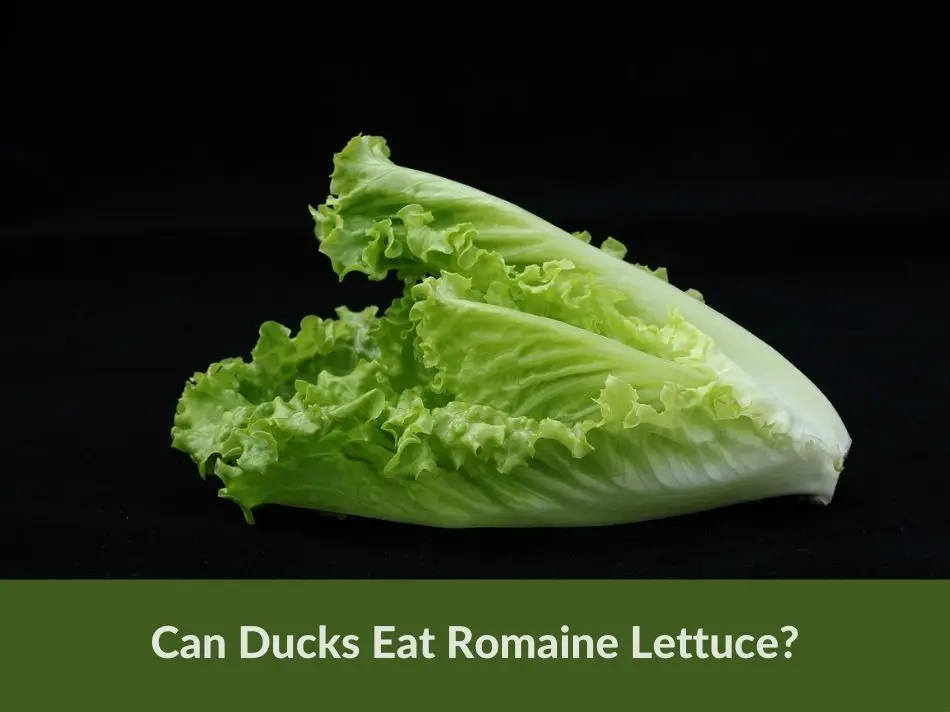In their natural habitat, ducks primarily feast on a diet of small aquatic insects, plants, and even tiny fish. They have a varied diet that can be classified as omnivorous. From seeds to snails, our feathery friends aren’t too picky. But, can ducks eat romaine lettuce?
Yes, ducks can eat romaine lettuce. It can be a great nutritious addition to their diet. It’s softer and easier for ducks to digest compared to other harder vegetables. Romaine lettuce provides hydration and some essential vitamins that can benefit our feathery friends.
In this article, you’ll discover the benefits of feeding ducks romaine lettuce, the right way to offer it, and the importance of a balanced diet for our feathered friends.
How Often Can I Feed My Ducks Romaine Lettuce?
While ducks might happily gobble down any amount of romaine you offer, it’s best to provide it in moderation. Consider romaine lettuce as a treat or supplement to their primary diet. Offering it a couple of times a week is a great way to incorporate romaine lettuce into their diet.
Can Ducklings Eat Romaine Lettuce?
Ducklings are generally open to a wide range of foods, and romaine lettuce can be introduced early on. However, it’s important that the lettuce is chopped into tiny, manageable pieces. Large pieces can become a choking hazard for these little quackers.
As with adult ducks, romaine should be a supplement, not the main course, as ducklings require more protein-rich foods for healthy growth.
Romaine Lettuce Nutritional Value
Below is the nutritional value of 100 grams of romaine lettuce.
- Calories: 17
- Protein: 1.2 g
- Carbohydrates: 3.29 g
- Fiber: 2.1 g
- Water: 94.61 g
It also contains several vitamins and minerals as listed below.
- Vitamin C
- Calcium
- Vitamin K
- Vitamin A
- Folate
- Phosphorus
- Magnesium
- Potassium
Are Romaine Lettuce Healthy for Ducks?
Yes, romaine lettuce is very healthy for ducks. Romaine lettuce offers hydration and is a source of essential vitamins like Vitamin A and K, which are very beneficial for ducks. Below are some health benefits of ducks eating romaine lettuce.
- Vitamin C: Helps ducks heal and keeps their feathers looking good. Makes them feel better too.
- Calcium: Good for strong eggs and healthy bones. Helps ducks eat and move around.
- Vitamin K: Stops bleeding if ducks get hurt. Keeps them safe.
- Vitamin A: Helps ducks see better. Makes their skin and feathers shiny.
- Folate (B9): Helps ducks have healthy babies. Keeps the duck family growing.
- Phosphorus: Gives ducks energy. Helps them swim and move.
- Magnesium: Calms ducks down. Makes them feel relaxed.
- Potassium: Good for duck’s heart. Helps them quack and fly better.
How To Feed Romaine Lettuce To Ducks
- Wash the Lettuce: Always ensure it’s clean and free from pesticides.
- Chop it Up: Tear or cut the lettuce into smaller, manageable pieces. For ducklings, even smaller pieces are essential.
- Hand Feed or Scatter: You can either hand feed them or scatter the pieces on the water. Ducks love foraging and will enjoy the process.
- Water: Essential with every duck meal! Always ensure ducks have access to clean water when feeding them. It helps them swallow and digest their food
Other Berries Ducks Can Eat
Ducks have a diverse palate, and a variety of vegetables can be both a treat and a healthy addition to their diet. Aside from romaine lettuce, there are numerous veggies that these feathered beings relish and below are some more that you can feed them.
When introducing these delights, always give in moderation and, as always, have fresh water ready for the ducks.
Conclusion
Romaine lettuce is a wonderful treat for ducks in small amounts. They absolutely enjoy it, and it provides them with refreshing hydration and essential vitamins. Whether you’re a loving caretaker or a joyful park visitor, it’s a joy to feed the ducks.
Disclaimer: The information in this article is for informational purposes only. I'm not an expert or a veterinarian.


